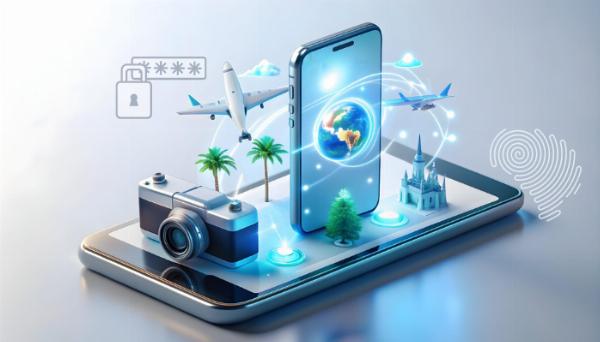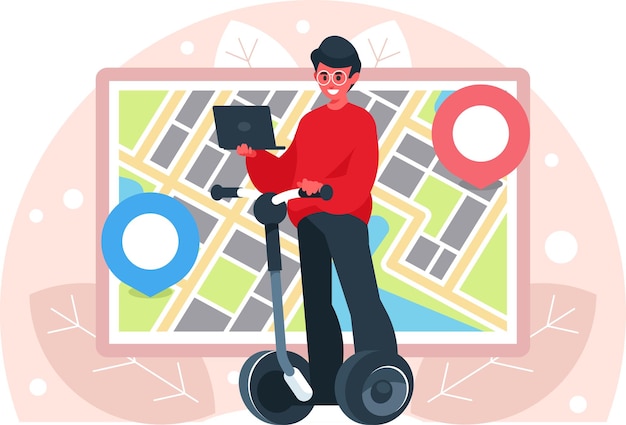How AI is Enhancing Security in Travel App Development

Strong 8k brings an ultra-HD IPTV experience to your living room and your pocket.
In an era where digital transformation is reshaping industries, the travel sector is not an exception.
✍️ Curious about the differences between native, hybrid, and progressive web apps? Our comprehensive app development guide breaks down each type with pros, cons, and use cases.
As travel apps thrive, providing users with seamless experience from booking to on-the-ground services, the importance of security has become paramount.
Cyber threats are increasingly sophisticated, targeting personal data and financial information. In this landscape, Artificial Intelligence has emerged as a powerful ally in enhancing security within travel app development.
This blog explores the various ways AI is being utilized to strengthen the security of travel applications.
Understanding the Need for Enhanced Security
The travel industry collects huge data.
Users share sensitive information such as passport details, credit card numbers, and personal preferences, making travel apps a target for such attacks.
Besides that, the COVID-19 pandemic has accelerated the adoption of digital solutions in travel. With more travelers relying on apps for bookings, itineraries, and health information, the stakes for robust security have never been higher.
Let’s see how AI is helping the travel industry with better security:
1. Intelligent Fraud Detection
First things first, one of the most significant threats to travel apps is fraudulent transactions.
AI enhances security by employing machine learning algorithms that analyze user behavior in real-time.
By establishing a baseline of normal activity, these systems can detect anomalies, such as unusual spending patterns or login attempts from unfamiliar devices or locations.
For example, if a user typically books flights from the USA but suddenly tries to change it to somewhere else, AI can flag this transaction for further verification.
This proactive approach minimizes the risk of fraud before it can cause significant harm.
2. Biometric Authentication
Traditional passwords can be easily compromised, for which biometrics is a game changer in travel app security.
AI powers various biometric technologies such as facial recognition, fingerprint scanning, and voice recognition.
These methods provide a more secure means of user verification, making it difficult for unauthorized users to gain access.
Travel apps can implement these technologies at critical points, such as during login or completing transactions.
By ensuring that only the legitimate user can access sensitive information, biometric authentication significantly enhances security.
3. Predictive Analytics for Threat Mitigation
AI-driven predictive analytics can forecast potential security threats by analyzing vast amounts of data from various sources.
This includes historical data on cyber threats, user behavior patterns, and current global events.
By identifying trends and potential vulnerabilities, travel app developers can proactively address them before they escalate.
For instance, If AI detects a rise in phishing attacks targeting travel users, your travel app development company can implement additional security measures or user education campaigns to mitigate the threat.
This anticipatory approach is important in an environment where cyber threats are constantly evolving.
4. Real-Time Security Monitoring
AI facilitates continuous monitoring of travel app systems, allowing for immediate identification and response to security threats.
Machine learning models can analyze incoming data streams to detect potential breaches or suspicious activities in real time.
By automating the monitoring process, travel companies can respond to threats more swiftly than human teams could.
For instance, AI can initiate a lockdown of sensitive data while alerting security teams, thus minimizing potential damage.
5. Enhanced Data Encryption
Data encryption is a cornerstone for digital security, ensuring that sensitive information remains unreadable to unauthorized users.
AI enhances encryption methods by analyzing patterns in data access and usage, leading to more encryption strategies.
There are several methods like Biometric authentication and fingerprint scanning. These methods are not only more secure than traditional passwords but also provide a seamless user experience.
With AI algorithms continuously learning and adapting, they can improve the accuracy of this authentication, minimizing false positives and negatives.
Additionally, AI can monitor and analyze user behavior to detect if an account has been compromised. If any suspicious activity is detected, the app can prompt users for additional verification before granting access.
6. Personalization with Privacy in Mind
AI enables travel apps to provide personalized experiences for users, but this personalization must be balanced with privacy considerations. AI can analyze user data to offer tailored recommendations for hotels, activities, and travel itineraries.
However, this data must be handled securely.
By implementing AI algorithms, one can anonymize user data, allowing them to deliver personalized experiences without compromising individual privacy.
Ensuring sensitive information is encrypted and only accessible in its anonymized form, developers can protect users while still providing value.
7. Secure Payment processing
Payment security is a top concern for travelers using mobile apps.
AI enhances this aspect by providing robust fraud detection mechanisms during transactions. By analyzing transaction patterns and using ML algorithms, travel apps can identify possible fraud activities in real-time. This might
For example, if a user is trying to make a huge transaction shortly after their account has been accessed from a different device, the app can flag it as suspicious and require additional verification.
Furthermore, AI can monitor payment gateways for unusual activities, helping to prevent data breaches before they occur.
8. Weather and Traffic Prediction
As you know, the integration of Artificial Intelligence prediction capabilities is vital for travel apps. When developers build a travel app that leverages real-time data and predictive analytics, users gain timely alerts about weather changes and traffic conditions.
This allows for smarter planning and helps avoid delays. Accurate forecasts prepare travelers for their journeys, while live traffic updates keep them informed about potential disruptions.
By integrating these features, travel apps enhance user satisfaction and ensure a safer travel experience.
9. Enhanced user experience
AI enhances user experience in travel apps by offering personalized recommendations based on user preference and past behavior.
Intelligent chatbots can provide instant support, answer queries, and assist with bookings around the clock. AI-driven dynamic pricing alerts notify users of price changes, helping them secure the best deals.
Additionally, predictive analytics anticipate user needs, such as suggesting activities or accommodations during their trip.
By streamlining the booking process, and providing tailored information, AI creates a more engaging and efficient travel planning experience, ensuring users feel valued and supported throughout their journey.
The Future of AI in Travel App Security
As the travel industry continues to evolve, so too is the role of AI in-app security. Innovations in AI technology, such as quantum computing and advanced machine learning techniques, will further enhance the capabilities of security systems.
The increasing adoption of AI-powered security solutions will not only help to mitigate the risks but also foster greater trust between users and travel app providers.
As security concerns remain a top priority for travelers, companies that invest in robust AI security measures will undoubtedly gain a competitive edge in the market.
Conclusion
AI is revolutionizing security in travel app development, providing tools and techniques that enhance the safety of user data and transactions.
From fraud detection to personalized alerts, the integration of AI technologies empowers developers to create secure applications that meet the needs of today’s travelers.
As the travel industry continues to grow and evolve, embracing AI as a critical component of app security will be important for fostering user trust and ensuring a safe travel user experience.
The future of travel apps will undoubtedly be shaped by the continued developments in AI, paving the way for a more secure and timeless travel experience for all.
Note: IndiBlogHub features both user-submitted and editorial content. We do not verify third-party contributions. Read our Disclaimer and Privacy Policyfor details.







